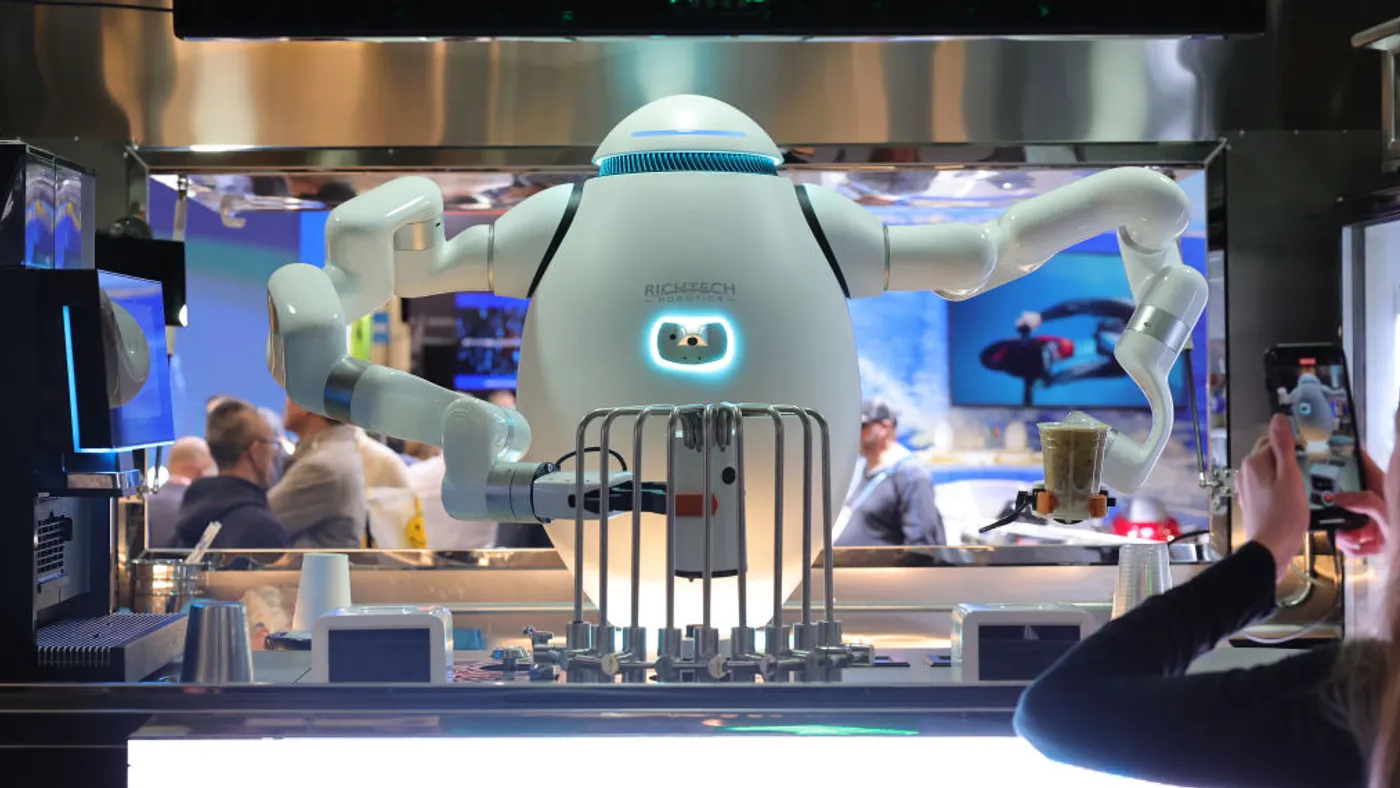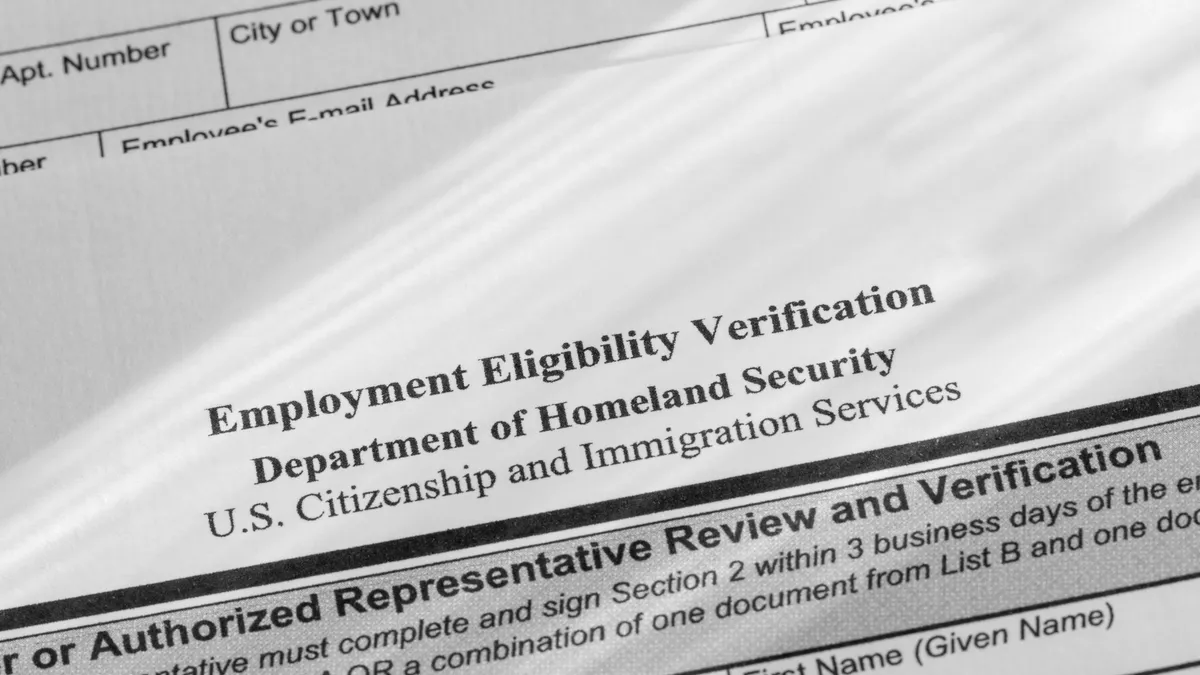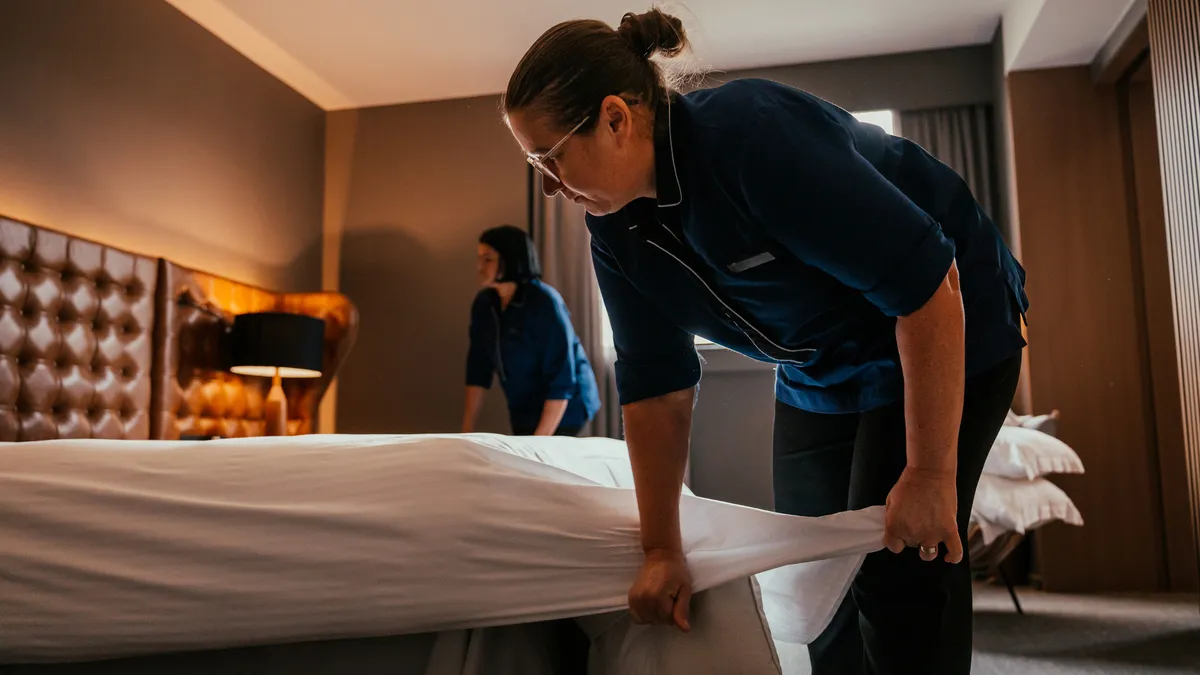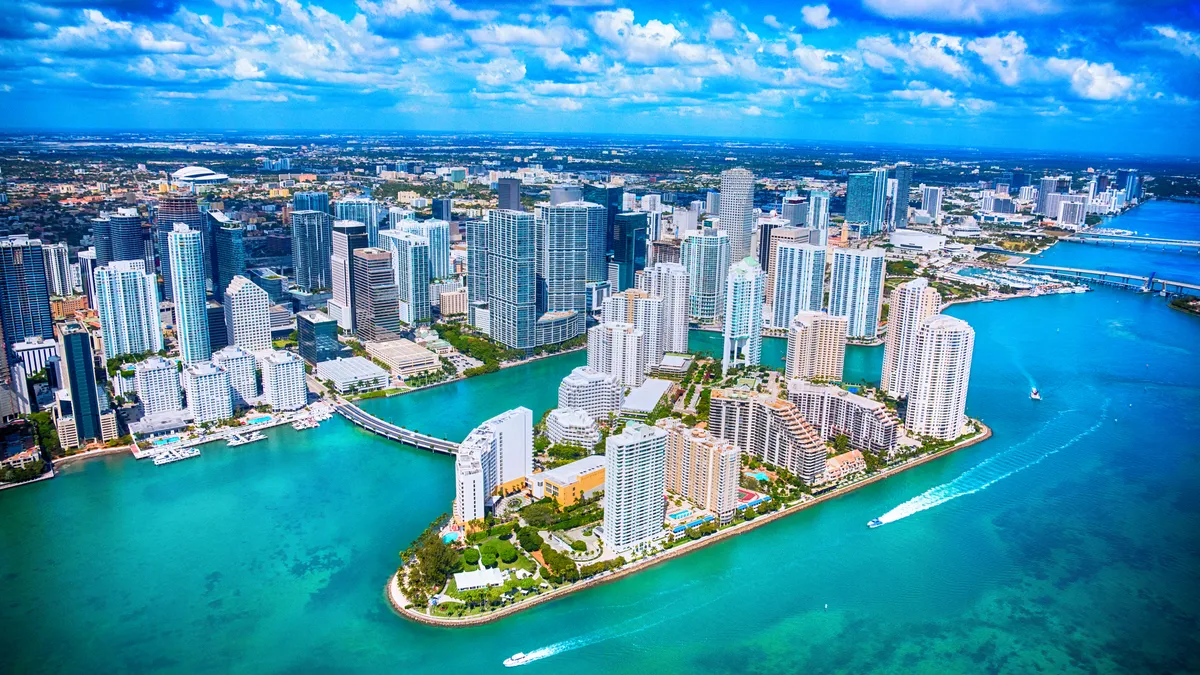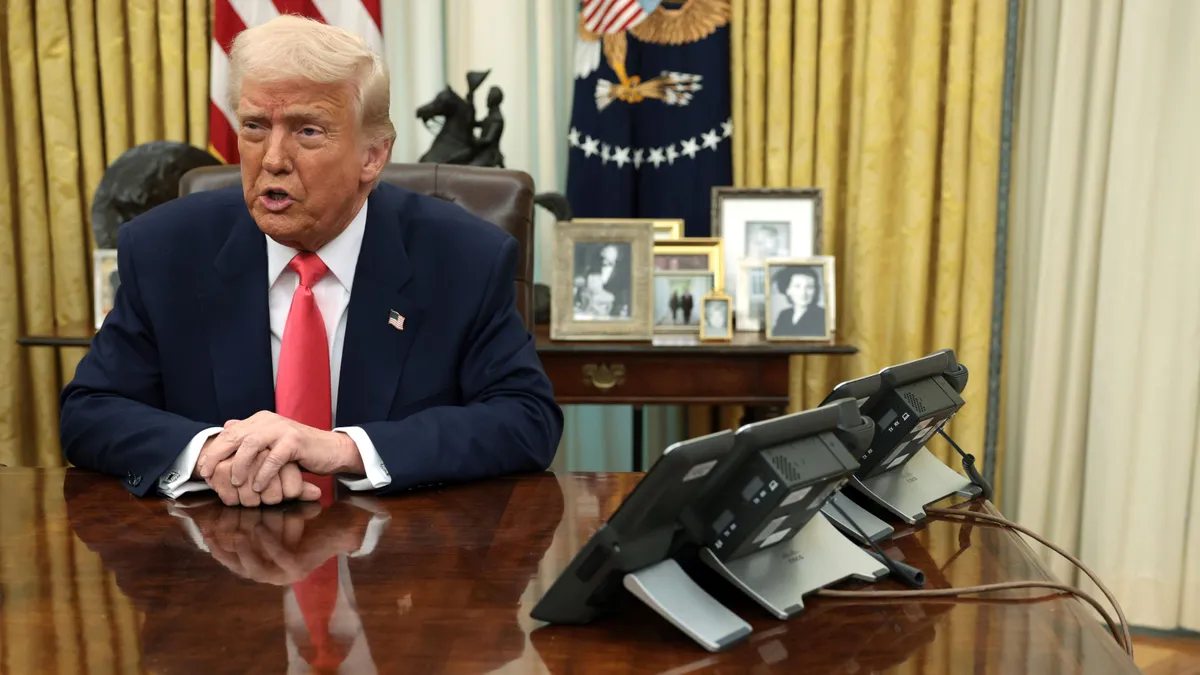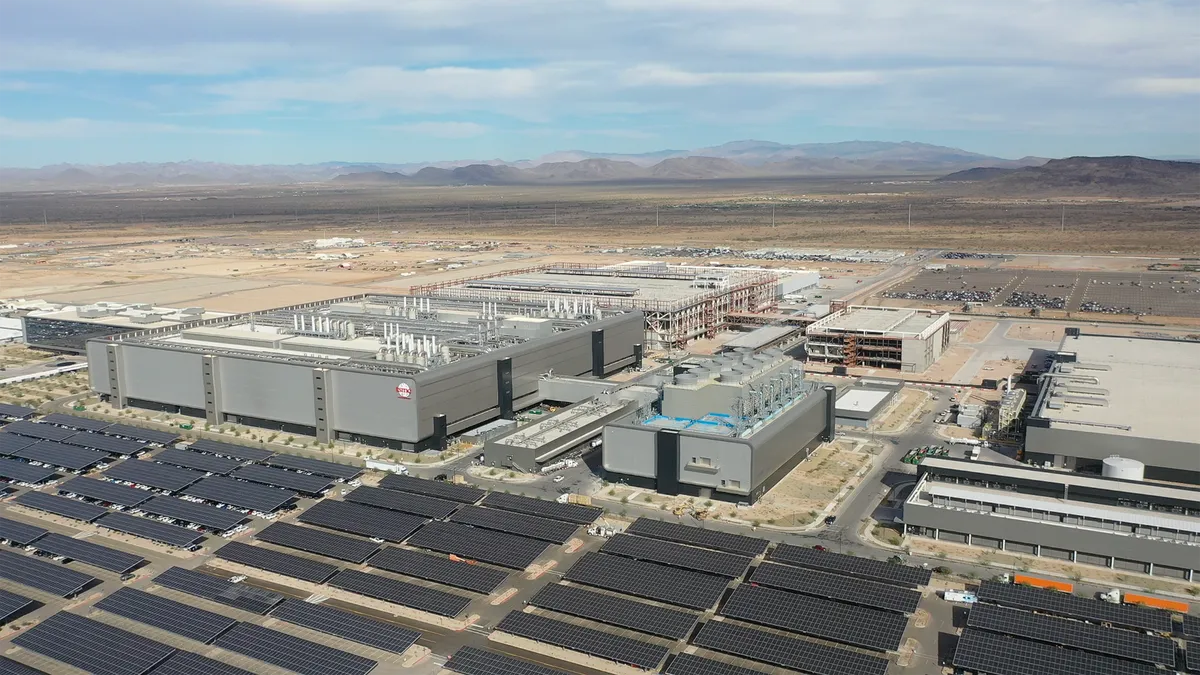How do you like your eggs? At CES 2024 in Las Vegas, that was a question asked not by food service staff, but by a robot. When conference attendees responded, the robot cracked an egg and made it just how they liked.
Elsewhere at the event, another robot gave massages, and another still made lattes. The robots in action caught the attention of the event's 135,000 attendees, circulating in videos online and being featured in post-conference roundups of the show's coolest tech.
However, one group of CES attendees wasn't there to marvel. Rather, the delegation from the Culinary Workers Union Local 226 and Bartenders Union Local 165 — Nevada affiliates of national hospitality union Unite Here known collectively as the Culinary Union — was there to see which robots were doing their service jobs.
“Everything I saw [at CES], I asked myself, ‘How is this going to impact workers and their jobs?’ No one is talking about that over at the convention center,” said Liz Shuler, president of AFL-CIO, the nation’s largest federation of unions, of which Unite Here is a part. Shuler was opening a panel discussion at the Labor Innovation and Technology Summit, held concurrently in January with CES in Las Vegas.
Members of the Culinary Union — which represents approximately 60,000 workers in Nevada — were present at the LIT Summit where Schuler was speaking, too. A few months earlier, in November 2023, the union made headlines for winning historic wage increases after threatened strikes at major resorts along the Las Vegas Strip. Included in the contracts was language around technology protections, aimed at mitigating technology’s impact on member workers’ jobs.
Outside of Las Vegas, ongoing hotel strikes this year have largely revolved around pay, which workers claim is insufficient to meet the rising cost of living, and reversals of pandemic-era staffing cuts. But hospitality and labor experts believe tech will become a linchpin, not a clause, of union contract fights in the future.
Meanwhile, hotels are continuing to adopt technologies that streamline operations — and the quick pace of change in available technologies means it’s difficult to predict which ones, exactly, will be the subject of future hospitality labor battles.

Tech’s threat to union jobs
Fears over technology replacing worker jobs are nothing new. In the hospitality industry, the issue can be traced back to the invention of automatic dishwashers in the mid-20th century, which streamlined kitchen operations and replaced human dish washers across the country, Bill Werner, an associate professor at the University of Nevada Las Vegas’ Harrah College of Hospitality, told Hotel Dive.
However, in recent years, the pace at which hospitality-related technologies are being developed and adopted has evolved rapidly. According to an October 2023 study from JLL, hotel operators cited technology upgrades as a top priority for 2024. For robots in hospitality, specifically, the global market is projected to reach $2.2 billion by 2030, growing at a CAGR of 21.5% from 2023 to 2030, according to Research and Markets.
Speaking at the LIT Summit in January, Unite Here’s then-president D. Taylor said he had been going to CES for years, “but it was 2017 when I said, ‘Holy tamale. We are in deep trouble if we don't deal with [the growing influence of tech],’” he said.
The following year, the Culinary Union added language around technology adoption to its contract. In its contracts negotiated in 2023, the union “protected and expanded” that clause, Bethany Khan, a union spokesperson, told Hotel Dive.
For members of the Culinary Union, their technology-related worries go beyond robot replacements — encompassing everything from workflow-optimizing apps to artificial intelligence. And while the union’s contract language offers protections around how technology is used at hotels, it does not prevent companies from deploying new technologies in the first place.
“There's nothing in the contract that has any restriction on the management about whether they use automation,” Werner said. “That's completely up to the hotel. The contract is just about the effect [of technology] on the employees.”
The current Culinary Union contract language states that hotels must notify workers up to six months before implementing any technology — including AI — that could impact union member jobs. It also requires employers to train staffers on how to use new technologies for free and offer a severance package including six months of health and pension benefits if a unionized worker is ever laid off due to technology.
The 2023 contracts also introduced workers’ right to bargain over any technology that tracks the location of employees or shares their data and established the tipped workers’ right to compensation if technology renders a tipped employee unable to do his or her job.
“The Culinary Union has led the fight for respect on-the-job,” Khan told Hotel Dive.
Unite Here added language concerning technology in 2018 as well, though the latest round of negotiations is not expanding or fortifying that language, a spokesperson told Hotel Dive. Werner said he believes that’s because the workers are preoccupied with fighting for higher wages and reversals of pandemic-era staffing cuts.
“It'll probably be a much bigger battle down the road,” Werner said, adding that the newly signed Culinary Union contracts are good for five years. “Five years from now, what's the technology going to look like? None of us have any idea.
“I think the next time these contracts come around … it's going to be a much more critical issue, because [hotels will] have a lot more options about what they can automate and how much that costs to do that.”
Automation falls short — for now
Though robots in action grab headlines, they’re not exactly replacing hospitality workers — yet. Werner pointed to an episode at The Venetian’s Tipsy Robot bar in Las Vegas. The robot-staffed bar went viral in early 2023 when a TikToker filmed the ordering screen, which asked for a 10% service fee. “I normally wouldn’t mind an automatic 10% tip for making my drink, but you’re a robot,” user @uptin said.
“That became kind of a funny story here,” Werner said. “But people I talked to didn't like [the robot bartender]. ... They pour weak drinks because they measure exactly one ounce. Every bartender in Vegas overpours.”
According to Werner, the robot bartender — like other robots in hospitality and on display at CES — has not left the realm of gimmickry.
“There's not really been any big shift yet toward automation,” he said, and for a few reasons. For one, “the return on investment is not very clear,” given the industry is unsure of how customers will react.
Not to mention, the current cost of such robots is too high for many hotels. The robot that mixed drinks at this year’s CES, for instance, Richtech’s “Adam,” was going for $180,000, according to Inc. There are, however, robot use cases that make more sense for hotels. For instance, back-of-house food prep roles could more easily be automated — for example, to chop vegetables.
“The [cost will] come down,” Werner said. “Technology eventually will catch up in the pricing.”

Optimizing the employee experience
For hotel workers, there are more immediate technology-related concerns than robot replacements. Elena Newman, for instance, is worried about a familiar technology: a smartphone app.
A guest room attendant at Mandalay Bay in Las Vegas, Newman spoke at the LIT Summit about what happened when her manager required her to use an app that organized her cleaning schedules. Whereas previously, guest room attendants at Mandalay Bay were given a paper sheet of rooms that needed cleaning — meaning workers could choose in which order to clean those rooms — the app would instead decide where Newman should clean and when.
“If the smartphone decides which ones to clean, [it] will send us to different floors, different wings [of the hotel],” she said in a panel discussion. “Imagine pushing that heavy cart full of stuff, running here and there.”
Newman described organizing with her fellow workers to push back against the use of the app, and eventually, the resort relented. “A smartphone doesn't clean rooms. We clean rooms,” she said.
Meanwhile, many hotel industry professionals say tech is creating greater efficiencies in staffing and workflows — and can actually improve the employee experience when deployed correctly. According to the American Hotel & Lodging Association’s 2024 State of the Industry Report, hotels are looking to AI to streamline workflows, maximize their workforce and “revolutionize” operational efficiency “in line with the growing industry demand for flexibility in performing various job roles and responsibilities.”
When businesses use technology to take over rule-based, repetitive tasks, “employees are freed to spend more time addressing guests' emotional needs,” said Bob Vergidis, founder and chief visionary officer at POS technology provider Point of Sale Cloud.
“If someone visits your hotel for the first time, the primary goal should be to turn that guest into a loyal fan who will not only return but also influence others to visit. This is where humans excel,” he said. “We don't need more people to press buttons. We need more people to enhance the human connection.”
Vergidis also believes that technologies that reduce employees’ cognitive load can serve as a retention tool, particularly for members of Gen Z, who demand better work-life balance than previous generations. Some 64% of front-line managers in the hospitality industry say workers have left their roles due to burnout, according to an August report by Axonify.
Retention is top-of-mind for hotel managers, many of whom are struggling to fill open roles, according to AHLA. Technology that succeeds in improving the work experience for an employee could actually help alleviate the ongoing labor shortage, according to Alexander Mirza, co-founder and CEO of Mogul Hospitality.
“We need really bold and big innovations on the human capital side, and leadership to address [the labor shortage],” he said. “How could the industry, for example, work together to recruit and develop talent and provide careers to people, and use, potentially, AI to do that?”
In the meantime, innovation continues to accelerate, with hoteliers adopting technology for everything from concierge services to massage therapy. And though new technology will be adopted whether unions like it or not, when it comes to technologies that don’t improve the employee experience, workers are likely to fight.
“We will continue to enforce this technology language,” Khan told Hotel Dive. “Everyone deserves the right to dignity at work, the opportunity to provide for their family, and to have job security — we will continue to lead the fight for those rights.”
Visuals Editor Shaun Lucas contributed to this story.


